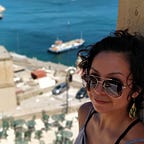Culture
Awareness
--
A few days ago, I was having a conversation with a friend, and I told her that I felt disconnected from my Latina identity.
I have been living in Dubai for nine years, and my culture is sometimes a faint memory.
So what do I do when I realize I have to immediately solve a personal issue: I obsess on how to find a solution. I started with my social media platforms, including Spotify, and realized that I was following absolutely no Latina inspired accounts. All my accounts were predominately white women. I felt ashamed because I never noticed. So here I am, desperately trying to figure out how to reconnect with my culture, and I see that my books, podcasts, news channels are all English speaking and white. Don’t get me wrong, I don’t have an issue with following white culture, but I want to see and hear my people. The Latino population is my people.
Identity is deeply personal, and I identify as Latina. In this post, when I speak about Latino identity, I am referring to a specific population; those born or who live in the states and have ancestors from a Spanish-speaking country.
(If you want to read a bit about Latino identity terms check out this blog: https://www.nas.org/blogs/article/ask_a_scholar_what_is_the_true_definition_of_latino
I mention this because I often hear people who are from other parts of Latin America identify as Latino. Latino households will always have at least two cultures: American and the country of our parent’s homeland.
I was born in the USA, and it’s my home, but being a first-generation Latina means that I was raised in a bilingual household like many Latinos, and that’s how we recognize one another so quickly because we spoke Spanglish and grew up with Univision in the background even if no one was watching. Because we use words like “yarda, parquear, chequear, and taggear.” Because Rice and Beans were always available, translating for my mother was a responsibility, and parenting for my younger siblings was a role I took on. I was and still am a bridge between El Salvador and the USA because I understand both cultures. I believe that first-generation children have a tremendous responsibility to unite two cultures and heal cultural misunderstandings. This fact was so prevalent in my life growing up, but now I live in a place that does not need my identity because it doesn’t exist in this society.
My people are not here, and so I have forgotten and blended into a different community. An ex-pat community.
Living as an ex-pat has allowed me to learn and engage in topics that I may have not otherwise, and I am grateful for the growth I have experienced. I have met people from all over the world and have seen the beauties of many cultures. I have developed a love for cuisines like Thai, Indian, Pakistani, Austrian, and Japanese. My lifestyle has encouraged me to dive into topics of wellness, natural skincare, and cooking, to name a few, and I have relished those moments. I’m not saying that in the states, I wouldn’t have been able to have these hobbies and interests, but I know it would have been challenging to find the time. My career path, social expectations, and lifestyle were heading in a different direction. In the states, commuting, having weekends free, and possibly working a few jobs is expected. In Dubai, we are only allowed to work for one employer due to visa restrictions, and it’s a relatively small city, so those two facts directly impact my lifestyle. I also work in the airline industry as a flight attendant, which automatically puts my availability differently.
Earlier I mentioned bridging together two cultures and the responsibility that entails. I realize that I now need to bridge two cultures for myself.
Thanks, 2020, for the reflection.
If you can relate! Please comment below!
